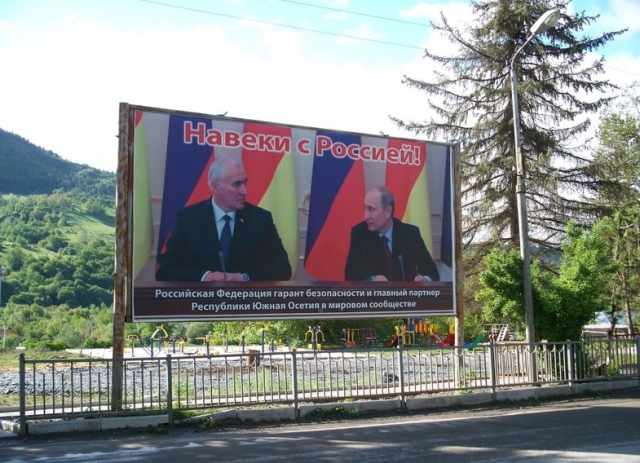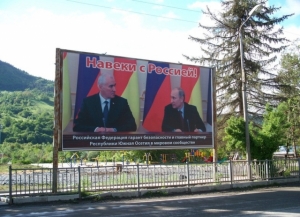South Ossetian Separatists Plan Referendum on Joining Russia
TSKHINVALI, South Ossetia - The de facto head of Georgia’s breakaway South Ossetia region announced earlier this week that the Moscow-backed rebel government plans to hold a constitutional referendum later this year on officially joining the Russian Federation.
“We are discussing possible dates [for the referendum] at the moment. There's no specific date yet, but it will happen in the near future. Before August,” the region’s rebel President Leonid Tibilov told Russian state media on Monday.
According to Tibilov, the referendum will change the disputed territory’s existing constitution in a way that would allow it to abolish its breakaway status and claims to independence in favor of a full union with Russia.
Once the region’s constitutional status is changed, South Ossetia’s legislative body can then legally call on Moscow to officially annex the territory.
Tibilov had originally told journalists on April 4 that he had reached an agreement with Russian President Vladimir Putin on the creation of "a single union" with Russia, wherein South Ossetia would cede its legislative authority to the Russian government.
At the time, Tibilov explained that he and Putin had devised the scheme as a way of avoiding a further round of international condemnation of Russia after Moscow invaded and illegally annexed Ukraine’s Crimean Peninsula in March 2014.
By Monday, however, Tibilov had changed his tune saying the breakaway republic would hold a referendum on full annexation instead of a union state.
“We need to introduce changes to article 10 in the current constitution. This would enable the president to ask, with the approval of the republic’s parliament, the leader of Russia to consider the possibility of making South Ossetia a part of the country," Tibilov said.
Article 10 of South Ossetia’s constitution says that the republic is entitled to enter into an alliance with Russia.
Some believe Tibilov’s sudden reversal to call for South Ossetia’ full annexation is meant as a sign of loyalty to Putin and move to consolidate support for his re-election in 2017.
Though unconfirmed by outside observers, Russian and South Osserian polls frequently show near-universal support from the local population for joining Russia.
Putin was coy in his reaction to Tibilov’s proclamation when asked about South Ossetia’s planned referendum during his annual televised Q&A session with Russian citizens.
"Tibilov expressed his opinion that the people of South Ossetia want a referendum to be held. We cannot oppose this. There is nothing else other than the interests of South Ossetia’s people that we keep in mind. And we will make up our mind depending on the results of the referendum," Putin said.
As the Soviet Union imploded in the early 1990s, South Ossetia emerged as one of half a dozen regions that became flashpoints for ethnic or linguistic-based violence. Brutal separatist wars in Georgia, Moldova and Azerbaijan consumed the region from 1991-1996, with Moscow openly supporting and supplying the hardline pro-Russian rebels in the conflicts.
Similar to the current situation in eastern Ukraine, full-scale wars erupted when Russian-speaking communities in the newly independent states rebelled against the national governments, calling for closer ties with Moscow or a return to the Soviet Union.
Russia openly supplied arms, funding and troops to the separatist movements in the hope that they could continue to wield power in their former imperial dominions by supporting unrecognized breakaway states that swore fealty to the Kremlin and allowed Russia to base thousands of troops on their soil.
Georgian government forces fought and lost three wars against Russian-backed separatists in South Ossetia between 1991-2008.
The wars left thousands dead and led to the ethnic cleansing of the region’s historic Georgian population. South Ossetia was later recognized as an independent state by Moscow following the 2008 Russian-Georgian War.
By the end of the last decade, Russia had effectively occupied more than a quarter of Georgia’s territory.
International law and the United Nations continue to recognize the region as an integral part of Georgia.
By Nicholas Waller
Photo: Anton Krotov












